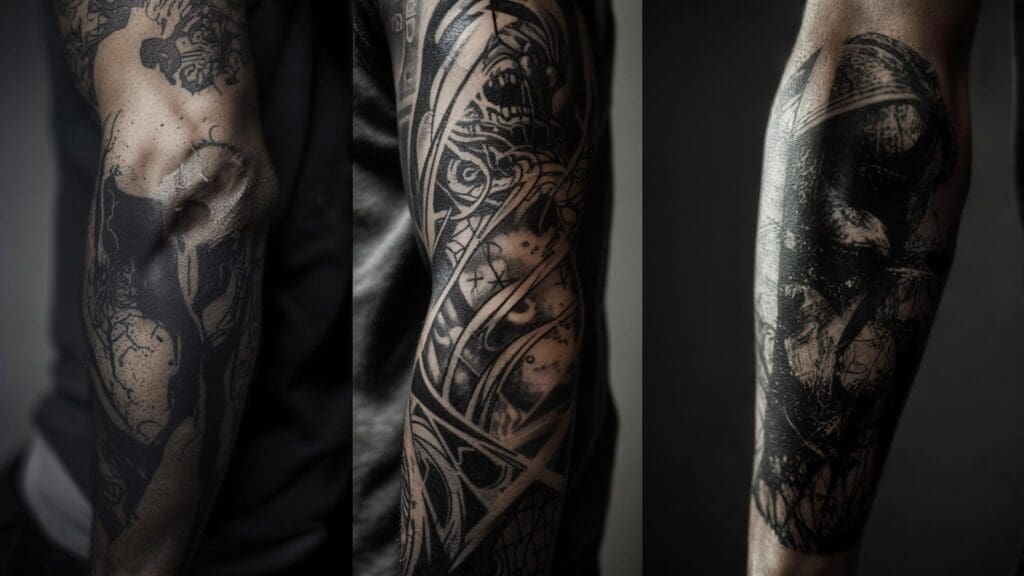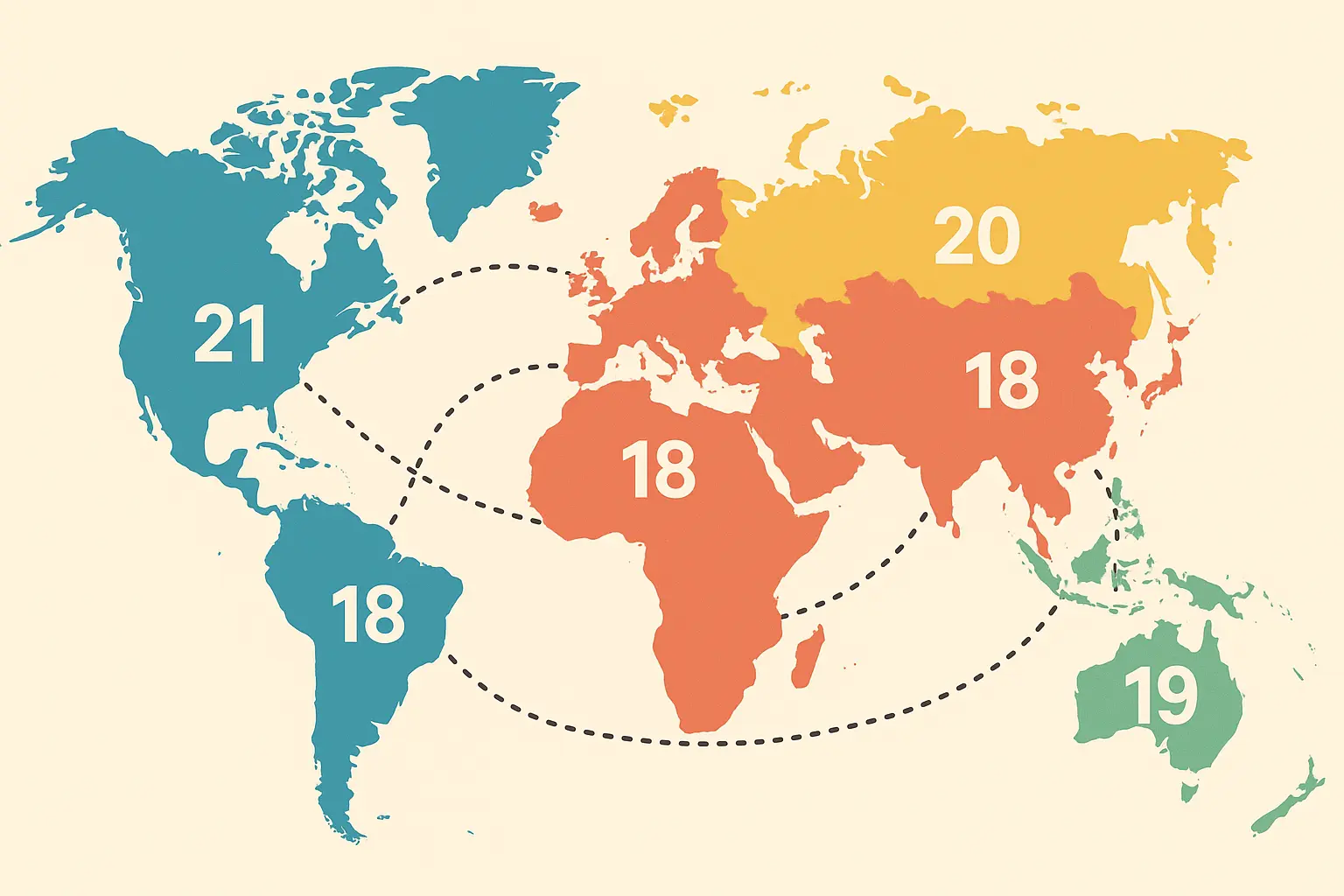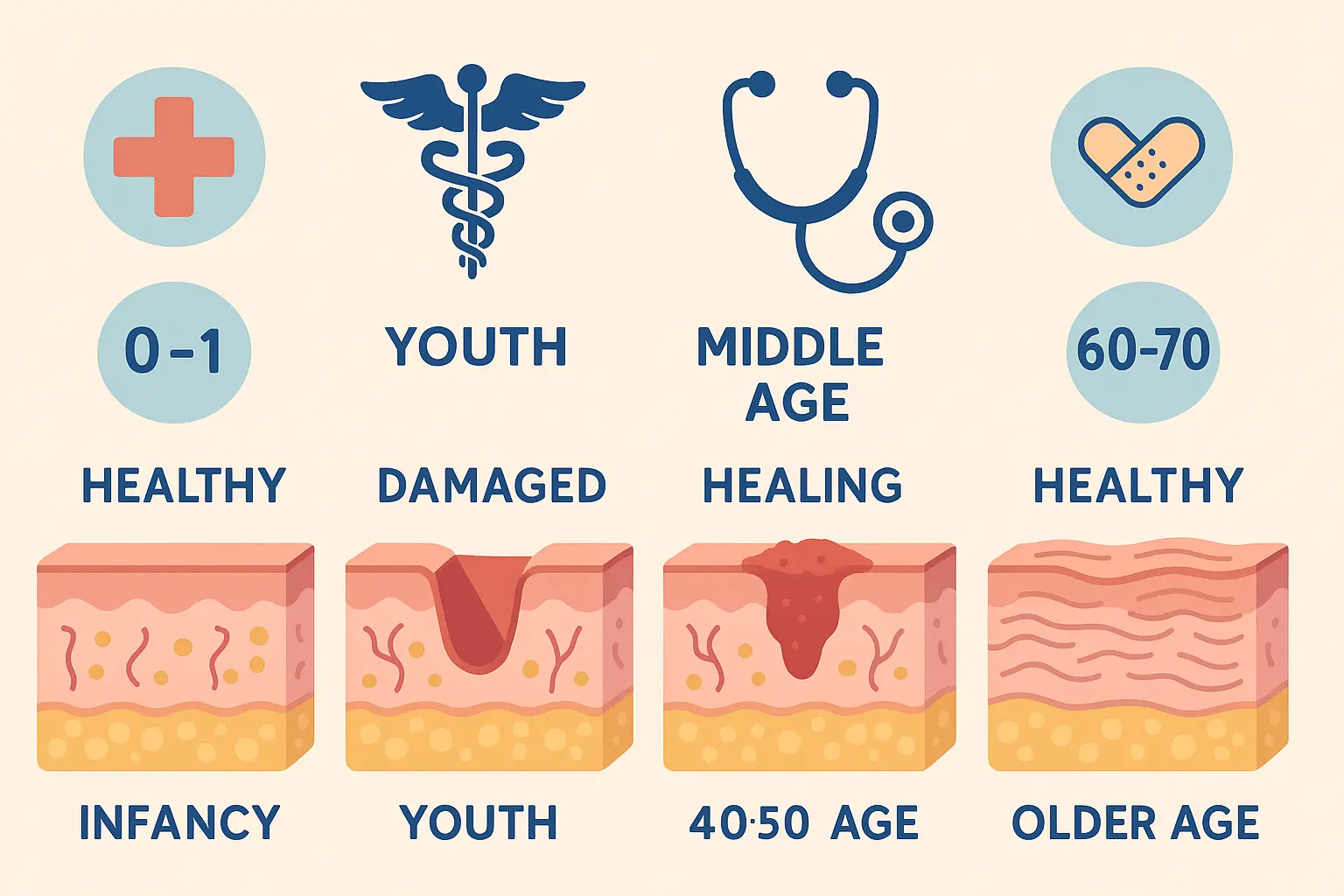What Age Can You Get a Tattoo? Here’s What I Wish Someone Had Told Me

I used to think tattoo age rules were simple – turn 18, get inked, done. Then I started really digging into this stuff, and wow, was I wrong.
The reality? It’s messy, complicated, and varies wildly depending on where you live, what your family thinks, and even which shop you walk into. Some places will turn away legal adults because their internal policies are stricter than the law. Others… well, let’s just say not everyone follows the rules.
Look around – chances are one in three people you know has a tattoo. That’s wild when you think about it. But here’s what really blew my mind: 22% of people have multiple tattoos, yet most of us have no clue about the legal landscape surrounding when someone can actually get their first one.
Here’s What We’re Going to Cover (Because This Stuff Gets Complicated Fast)
-
How different generations fight over what age is “appropriate”
-
Why your brain science matters more than you think
-
International laws that create total chaos for traveling families
-
Cool tech that might change everything (AI maturity tests, anyone?)
-
The money side nobody talks about
-
Medical stuff that actually matters
-
How social media is messing with everyone’s heads
The Quick Version
-
Legal age limits are just the starting point – your family, culture, and local tattoo shops all have their own opinions
-
Your brain keeps developing until 25, which explains why younger people regret tattoos way more often (25% vs 8% for older folks)
-
Different countries have completely different rules, making life hell for international families
-
Good tattoo shops often won’t work on anyone under 19-21, regardless of what the law says
-
New tech like AI and VR might totally change how we figure out if someone’s ready
-
When age rules are too strict, dangerous underground markets pop up
-
Social media creates pressure that didn’t exist when current laws were written
The Cultural Evolution of Tattoo Age Standards
Look, I thought I had this whole tattoo age thing figured out until I started really talking to people from different backgrounds. Turns out, the legal age is just the tip of the iceberg. What really matters is how your family, your community, and even your generation views tattoos.
Here’s something that blew my mind: 41% of people under 30 have tattoos, but only 13% of folks over 65 do. That’s not just a coincidence – it shows how dramatically things have changed and why family dinner conversations about tattoos can get so heated.
When Grandma Meets Gen Z (Spoiler: It Gets Awkward)
I’ve watched this play out so many times it’s almost predictable. Grandparents who think you should wait until you’re 30 and “have your life figured out.” Parents who got their first tattoo at 25 and think 21 is reasonable. And teenagers who see their friends getting inked at 16 and wonder what the big deal is.
Take my friend Jessica – she’s 17, has a part-time job, pays for her own car insurance, but her parents absolutely lost it when she brought up getting a small tattoo for her 18th birthday. Their argument? “You’re not mature enough.” Her response? “I’m literally moving out for college in six months.”
Sound familiar?
The thing is, both sides have valid points. Older generations have seen enough people regret their early tattoo choices to be genuinely concerned. Younger people feel patronized when they’re making other major life decisions but can’t choose their own body art.
When Tattoo Shops Set Their Own Rules
Here’s where it gets interesting – a lot of really good tattoo shops don’t care what the law says. They’ll turn away perfectly legal 18-year-olds if they think the person isn’t ready. I’ve seen shops that won’t do large pieces on anyone under 21, period.
Why? Because they’ve seen too many young people come back a few years later, upset about their choices. These artists aren’t trying to be difficult – they’re protecting their reputation and honestly, they’re looking out for you too. Professional tattoo artists often reference comprehensive pricing guides when explaining their elevated age policies, as younger clients may not fully understand the financial commitment involved.
One artist told me, “I’d rather lose a customer today than have them hate me in five years.” That stuck with me.
|
State |
Legal Minimum Age |
Typical Shop Policies |
Parental Consent Required |
|---|---|---|---|
|
California |
18 (no exceptions) |
18+ strictly enforced |
Not applicable |
|
Arizona |
No minimum with parent present |
15+ with exceptions |
Yes, parent must be present |
|
Texas |
18 |
18+ or 21+ for large pieces |
Not applicable |
|
Florida |
16 with consent |
18+ preferred |
Yes, notarized consent |
|
New York |
18 |
18+ or 21+ shop discretion |
Not applicable |
When Culture Trumps Law
This is where things get really complicated. Some communities have traditional tattooing ceremonies for teenagers that happen anywhere from 13-21 depending on their specific customs. These situations require family involvement and community approval processes that blend legal compliance with cultural significance.
I heard about a case in Arizona where a 9-year-old got tattooed with her parents’ consent as part of their cultural tradition. It went viral, and people had strong opinions on both sides. The legal system says one thing, but cultural traditions say another. Families caught in the middle have to choose between honoring their heritage and following modern laws.
There’s no easy answer here. How do you balance respect for traditional practices with modern safety standards and legal requirements? It’s a conversation that forces us to examine our assumptions about appropriate tattoo ages.
Psychology Behind Age-Appropriate Tattoo Decisions
Okay, here’s the part that might annoy you if you’re young and reading this, but bear with me. Your brain literally isn’t finished cooking until you’re about 25. I’m not trying to be condescending – this is actual science.
The part of your brain that handles long-term thinking and consequence evaluation? It’s still under construction through your early twenties. This isn’t me being mean – it’s why car insurance costs more when you’re young, why you can’t rent a car until 25, and yes, why some people think tattoo age limits should be higher.
The Regret Numbers Don’t Lie
This psychological reality directly connects to tattoo removal psychology research, which shows younger recipients are more likely to seek removal services later. Here’s what the research shows: 25% of people who got tattoos between 18-21 have some regret about them. For people who waited until 25? Only 8% feel that way.
I know Sarah (not her real name) who got her boyfriend’s name tattooed across her ribs when she was 18. They’d been together two years – practically forever in high school time. At 24, she’s spending thousands on laser removal because seeing his name every day makes her cringe.
“I was so sure we’d be together forever,” she told me. “I couldn’t imagine feeling any differently.”
Her story isn’t unique – I hear variations constantly from people who wish they’d waited a few more years. The teenage brain is literally wired differently when it comes to risk assessment and peer influence.
Impulse Control and Peer Pressure Create Perfect Storms
When your friends are all getting tattoos and posting them on social media, the pressure to join in can override logical decision-making processes that haven’t fully developed yet. Some 16-year-olds make excellent tattoo decisions while some 21-year-olds later regret their choices, highlighting the complexity beyond simple chronological age.
But here’s the thing – adolescent brain chemistry creates higher susceptibility to peer influence and impulsive decisions that don’t always align with what you’ll want long-term. It’s not about intelligence or maturity in the traditional sense. It’s about brain development.
Money Matters More Than You Think
Let’s talk about something nobody wants to discuss – can you actually afford a good tattoo? The ability to afford quality tattoo work and proper aftercare develops independently of legal age requirements. Quality work costs $200+ per hour, and that’s before aftercare supplies, touch-ups, and time off work for healing.
I’ve seen too many young people go to sketchy shops because that’s what they can afford. Bad tattoos don’t just look terrible – they can be dangerous. Infections, scarring, bloodborne diseases – the cheap route can cost you way more in the long run.
Before you even think about booking, ask yourself:
-
Can you afford $200+ per hour for quality work?
-
Do you have $500+ set aside for proper aftercare supplies?
-
Can you handle a 6-month healing timeline?
-
Have you researched your artist for months, not days?
-
Can you explain why this design matters beyond current trends?
-
Have you been thinking about this specific placement for over a year?
Financial readiness isn’t just about having enough money – it’s about understanding the true cost of getting a tattoo done right.
International Age Requirements Create Legal Nightmares
If you think navigating tattoo laws in your own state is confusing, try being an international family. I’ve worked with families where what’s perfectly legal in dad’s home country becomes a custody issue in mom’s jurisdiction.
Imagine this: You’re 16, your family moves from Germany (where you can legally get tattooed at 16 with parental consent) to California (where it’s illegal until 18, no exceptions). You already have a tattoo that’s now “evidence” of your parents breaking California law. Messy, right?
When Two Countries, Two Rules Collide
Different countries have wildly different approaches. Some require both parents’ written consent. Others accept one parent’s approval. Some countries don’t care about parental consent at all once you hit their age limit.
I know a military family where the mom is American, dad is German, and they’re stationed in Japan. Their 17-year-old wants a tattoo. Legal in Germany and Japan with consent, illegal in many U.S. states. Which law applies? Depends on where they plan to live next, what their custody agreement says, and honestly, which lawyer you ask.
Careful legal navigation becomes essential to avoid complications that could affect custody arrangements or legal standing. What seems straightforward can quickly become a legal nightmare when multiple jurisdictions are involved.
Documentation Verification Becomes a Nightmare
|
Country/Region |
Minimum Age |
Parental Consent |
Both Parents Required |
Additional Requirements |
|---|---|---|---|---|
|
United States |
16-18 (varies by state) |
Required under 18 |
Varies by state |
ID verification, notarization |
|
United Kingdom |
18 |
Not applicable |
No |
Strict ID requirements |
|
Germany |
16 |
Required under 18 |
No |
Written consent, ID verification |
|
Australia |
18 |
Not applicable |
No |
Strict enforcement |
|
Canada |
16-19 (varies by province) |
Required under majority age |
Varies by province |
Parental presence often required |
International age verification becomes complex when dealing with different ID systems, birth certificate formats, and translation requirements. I’ve seen situations where perfectly legitimate documents from one country aren’t accepted in another, leaving families stuck in bureaucratic limbo.
The paperwork alone can take months to sort out, assuming you can sort it out at all.
When Local Communities Override Official Rules
Local tattoo cultures establish informal age expectations that differ significantly from legal requirements, creating community-based standards that supersede official regulations. These community standards often carry more practical weight than legal requirements.
Faith-based communities establish their own age guidelines that either exceed or conflict with legal minimums, requiring individuals to navigate multiple authority systems. These community standards affect family relationships and social acceptance regardless of legal compliance.
In some Polynesian communities, traditional ta tatau ceremonies mark the transition to adulthood at 16, but modern legal requirements in many Western countries prohibit tattooing until 18, forcing families to choose between cultural tradition and legal compliance. These conflicts highlight how modern age laws sometimes fail to account for diverse cultural practices.
Technology is Revolutionizing Age Verification
This is where things get really sci-fi, really fast. We’re talking about AI systems that could evaluate your maturity level instead of just checking your ID. Virtual reality that lets you “live with” your tattoo design for months before making it permanent.
Sounds cool, right? But it also raises some serious privacy questions. Do you really want an AI system keeping permanent records of your tattoo decisions? What happens to that data? Who can access it?
Your Future Tattoo Might Need AI Approval
Advanced biometric systems and digital identity platforms create new possibilities for age verification while raising privacy concerns. These systems could provide legal protection for artists while ensuring proper consent documentation, but questions remain about privacy and permanent digital records.
Some companies are developing systems that would assess decision-making maturity beyond just age. They’d look at your history of major decisions, how well
Some companies are developing systems that would assess decision-making maturity beyond just age. They’d look at your history of major decisions, how well you’ve stuck with previous choices, your financial stability – basically trying to determine if you’re actually ready for something permanent.
Part of me thinks this could prevent a lot of regret. Another part of me wonders if we really want algorithms deciding who’s mature enough for body art.
Blockchain Creates Permanent Records (Forever)
Immutable digital records could track parental consent, age verification, and decision-making capacity over time, creating permanent documentation of the tattoo decision process. This technology provides legal protection but raises questions about privacy and the permanence of digital records.
The idea of having every tattoo decision permanently recorded on a blockchain makes some people uncomfortable, and I understand why. Do we really want our teenage tattoo choices following us around forever in digital form?
AI Might Judge Maturity Better Than Birthdays
Advanced AI systems could complement existing AI tattoo generators by evaluating decision-making readiness alongside design creation. These systems could provide more nuanced maturity assessments than simple chronological thresholds.
Imagine an AI that could evaluate whether someone is truly ready for a tattoo based on their decision-making patterns rather than just their birth date. It sounds like science fiction, but the technology is getting close to reality.
Virtual Reality Could Change Everything
VR technology allows potential tattoo recipients to live with their design decisions over extended periods, providing maturity-independent methods for evaluating decision quality. Advanced aging simulation software shows how tattoos will appear over decades, helping younger clients understand permanence through experiential learning.
Imagine being able to see exactly how your tattoo will look in 20 years. How it’ll age, how it might fade or blur, how it’ll look with weight changes or muscle loss. VR technology is getting close to making this possible.
This could be huge for people of all ages, but especially younger folks who have trouble visualizing long-term consequences. Sometimes seeing really is believing.
The Hidden Economics of Age-Restricted Tattooing
Here’s something nobody talks about – being young and wanting a tattoo often means paying more for everything. Higher prices, more paperwork, extra insurance costs that get passed on to you. It’s frustrating, especially when you probably have less money than older clients.
Why Young Clients Pay Premium Prices
Tattoo shops charge more for minors because everything is more complicated. Extra paperwork, potential legal liability, dealing with parents who might change their minds – all of that costs time and money. These hidden costs can increase tattoo prices by 15-30% for underage clients.
Here’s what’s really frustrating: income demographics show that 43% of lower-income adults have tattoos compared to just 21% of upper-income adults, yet younger clients often face the highest pricing barriers due to age-related legal requirements. So the people who can least afford higher prices are the ones getting charged more.
Plus, shops pay higher insurance premiums when they work with younger clients. Guess who ends up paying for that? You do, through higher session fees and more restrictive policies.
When Parents Face Long-Term Bills
Legal frameworks around parental financial liability for minor tattoo decisions vary dramatically, creating situations where parents may be held responsible for removal costs or medical complications years later. This long-term financial exposure influences parental consent decisions and family financial planning.
Most parents don’t realize they might be on the hook financially if something goes wrong, which adds another layer of complexity to family discussions about tattoo timing.
When Strict Laws Backfire
Here’s the dark side nobody wants to discuss – when age restrictions are too strict, people find ways around them. Usually dangerous ways.
Strict age requirements drive demand toward unlicensed practitioners who ignore age restrictions, creating public health and safety concerns. I’ve heard horror stories about kids getting tattoos in basements, garages, and other unsafe places because they can’t wait for legal age.
Health Risks Multiply Underground
The desire to bypass age restrictions leads to dangerous situations where minors receive tattoos in unsanitary conditions without proper safety protocols or emergency medical access. Both unlicensed providers and minor clients can face serious legal consequences, including criminal charges and permanent records.
California’s strict no-exception policy for minors has led to increased enforcement efforts, with tattoo artists facing up to 6 months in jail and $1,000 fines for tattooing anyone under 18, regardless of parental consent. This harsh enforcement pushes the practice further underground, making it even more dangerous for young people who are determined to get tattooed.
It’s a classic case of good intentions creating worse outcomes. When legal options are completely unavailable, people don’t just give up – they find illegal alternatives.
Medical Realities That Change Everything
Let’s get real about the physical side of this. Your body is still changing through your late teens and early twenties. That beautiful tattoo placed perfectly on your 16-year-old body might look completely different after a growth spurt.
I’ve seen teenagers get gorgeous tattoos that become unrecognizable after their bodies finish developing. A delicate script tattoo on a wrist can stretch and distort as arm bones lengthen and muscle mass changes.
Growing Bodies, Changing Tattoos
Ongoing physical development during adolescence can distort tattoo designs over time, making placement decisions more critical for younger recipients. Tattoos placed during rapid growth periods may stretch, compress, or shift unexpectedly as bodies continue developing.
Your skin heals differently at different ages too. Understanding proper tattoo aftercare becomes even more critical for younger clients whose skin healing patterns differ from adults. Younger skin often retains color better, but it’s also more sensitive to reactions and complications.
The aftercare routine that works for a 30-year-old might be completely wrong for a 16-year-old’s skin. These physiological differences require modified aftercare protocols and may influence design choices.
Medical stuff you need to consider:
-
Have your growth plates closed? (Usually 16-18 for girls, 18-21 for boys)
-
Any family history of keloid scarring?
-
Current skin conditions or treatments?
-
Do you understand the 2-4 week initial healing period?
-
Can you access dermatological care if complications arise?
-
Are you aware of potential ink allergies?
Your Immune System Isn’t Ready Until It’s Ready
Then there’s the immune system factor. Developing immune systems may respond differently to tattoo inks and healing processes, creating age-specific medical considerations. Younger individuals may have undiscovered allergies or sensitivities that manifest during the tattoo process, requiring more comprehensive medical screening.
I know someone – let’s call him Marcus – who developed an allergic reaction to red ink at 17 that required emergency treatment and left permanent scarring. His doctor said the reaction was more severe because his immune system was still developing, highlighting why medical screening becomes more critical for younger tattoo recipients.
These aren’t scare tactics – they’re real medical considerations that affect safety and outcomes.
Social Media’s Impact on Tattoo Age Decisions
Let’s be honest – social media has completely changed how young people think about tattoos. You’re seeing thousands of tattoo images daily, watching influencers get new ink weekly, and it all starts to feel normal and expected.
The pressure is real. When everyone in your feed is showing off their new tattoos, it’s natural to wonder why you have to wait. But here’s the thing – social media shows you the highlight reel, not the full story.
Digital Pressure Is Different Pressure
You’re not just dealing with peer pressure from friends at school anymore. You’re getting influenced by people you’ve never met, seeing content specifically designed to make you want things, and comparing yourself to carefully curated images.
Modern age requirements must account for social media pressure, digital peer influence, and online tattoo culture that didn’t exist when most age laws were written. Digital platforms create unprecedented peer pressure around tattoo decisions while raising new privacy concerns about age verification.
That’s a lot to handle when you’re also dealing with normal teenage decision-making challenges. The combination can create pressure to make permanent decisions for temporary validation.
When Influencers Target Kids
Tattoo-related content often targets younger audiences without considering age restrictions, creating desire misaligned with legal reality. This marketing creates demand among underage audiences who face frustration when confronted with age requirements, potentially driving them toward unsafe alternatives.
Young people increasingly seek validation through tattoo sharing on social platforms, creating pressure to get tattoos for digital approval rather than personal meaning. The constant stream of tattoo content creates an environment where getting tattooed feels normal and expected, regardless of age restrictions.
Privacy Concerns Nobody’s Talking About
All this digital age verification creates permanent records that might follow you forever. Age verification increasingly relies on digital systems creating permanent records, raising privacy concerns about tracking tattoo decisions across platforms and jurisdictions.
Do you want your teenage tattoo decisions documented in systems that future employers or insurance companies might access? Modern systems create digital records that may follow individuals throughout their lives, affecting employment and insurance opportunities.
It’s worth thinking about before you hand over all that personal information.
Tattoo Generator IQ addresses many age-related concerns by providing comprehensive educational resources alongside professional-quality design generation. The platform’s educational approach helps users of all ages understand artistic aspects of tattoo design, plus cultural, psychological, and practical considerations that contribute to successful tattoo experiences. For younger users approaching tattoo age requirements, extensive learning materials provide crucial context about decision-making and long-term considerations that complement legal age thresholds.
Final Thoughts
Look, I get it. Age restrictions feel arbitrary and unfair, especially when you feel ready and mature enough to make your own decisions. But after digging deep into this topic, talking to artists, parents, and people who got tattoos at every age, I’ve realized it’s not just about the number on your ID.
The complexity of tattoo age requirements extends far beyond simple legal minimums, encompassing cultural, psychological, technological, and practical considerations that affect decision-making at any age. Whether you’re navigating age requirements for yourself or a family member, understanding these hidden complexities helps ensure better long-term satisfaction with tattoo decisions.
It’s about being financially ready, emotionally prepared, and physically developed enough to make a decision you’ll still be happy with decades from now. Some people are ready at 18. Others need to wait until 25 or 30. There’s no shame in either timeline.
Age restrictions exist for good reasons – protecting young people from impulsive decisions they might regret, ensuring proper medical and psychological readiness, and maintaining industry standards that benefit everyone. However, the landscape is evolving rapidly with new technologies, changing cultural attitudes, and better understanding of decision-making psychology.
The most important thing? Don’t rush it. A good tattoo is worth waiting for, and a great tattoo is worth waiting for even longer. Your future self will thank you for taking the time to get it right.
The most important takeaway? Age is just one factor in tattoo readiness. Maturity, financial stability, cultural context, and personal circumstances all play crucial roles in determining when someone is truly ready for permanent body art. Take time to understand the legal requirements in your area, plus the broader considerations that will affect your long-term satisfaction with any tattoo decision.









